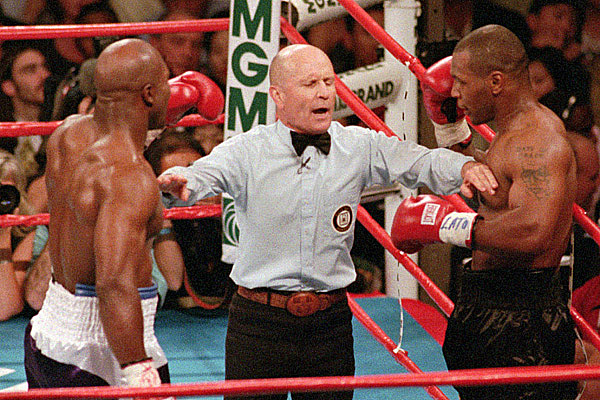One Man’s View: Neither Choir Boy Nor Devil
Money Maker
Jason Probst Jul 18, 2011

After biting Evander Holyfield and being convicted of even
worse, Mike Tyson was licensed to fight in the U.S. | AP
Photo/Lennox McLendon
Presently, the CSAC has ruled that Sonnen may apply for a fight license since the June 29 expiration passed on his last one, but his tendentious relationship and testimony with the commission in previous appearances make that a dicey road for the time being. Ditto for Nevada, where Sonnen hoped to apply for a license in April but was unable to do so due to a biker rally.
Advertisement
The flip side of denying Sonnen a license is that state in question loses out on a hell of a lot of money, should he beat Stann. Listen, if Mike Tyson could be licensed to fight Lennox Lewis in 2002 there is no reason Sonnen should be treated any differently. Convicted of rape in 1992 and forever subject to press conference meltdowns and out-of-ring actions which included assaults and scuffles, “Iron Mike” was eventually re-licensed in the U.S. because he was too big to pass up.
Sonnen, in the worst-case scenario, failed to disclose something
which might have been relevant to keeping the playing field level.
He has yet to rape or bite anyone, assault people in random traffic
encounters, threaten to eat people’s children, etc.
Given the fact that future fights will surely include monitoring of his testosterone levels, it is hard to envision why any commission could let convicted murderers (Don King, later pardoned) promote, armed robbers (Bernard Hopkins and Cliff Etienne) and rapists (Tyson and Tony Ayala) box but suddenly inveigh against licensing Sonnen. He hasn’t been a choir boy, but he hasn’t committed violent felonies, either.
If Sonnen does run into an extended bureaucratic gang-bang -- some of it his own doing due to nebulous statements that engendered no small degree of resentment by the CSAC -- on his attempts to get re-licensed in California or Nevada, perhaps his attorneys should look up Muhammad Ali’s legal papers, which eventually got him reinstated to box in New York. Ali was denied the right after his refusal to be drafted, even though numerous state commissions had knowingly licensed violent convicts to box.
Perhaps Sonnen’s TRT treatment has key defenders -- doctors who are already grappling with TRT treatment, particularly with athletes in other sports -- who can educate commissions and regulators on the legitimacy of it. It has become a recurring issue in MMA, particularly in light of Nate Marquardt’s TRT treatment and failure to follow protocol regarding it with the Pennsylvania commission, which got him pulled from his June 26 bout with Rick Story and ultimately cut from the UFC. Marquardt served as the flavor of the month for fans and journalists gravitating to a sexy story with intrigue and flair, but he will certainly not be the last with regards to TRT in MMA.
Abraham Morgentaler, M.D., is one such advocate of TRT. An Associate Clinical Professor of Urology at Harvard University, Dr. Morgentaler is the author of “Testosterone for Life” and perhaps the nation’s best-recognized authority on low testosterone treatment. He has lobbied the PGA on behalf of golfers undergoing TRT, citing that nearly 20 percent of adult men suffer from “Low T,” which results in weakness, reduced strength and diminished energy and sleep patterns.
“If somebody is not making enough testosterone, then they are at an unfair [competitive] position,” Morgentaler said. “The problem or subtlety of it is to treat them so they have their normal, full potential. The danger is if they abuse or play the system too much. If somebody were able to raise their testosterone too high, that’s an advantage. If it were thyroid or insulin, nobody would have problem with those treatments. The problem here is that long history of abuse and cheating for people who are using substances that are T or T-like. That’s really the issue.”
Another unfolding issue with TRT treatment and how commissions handle each case is the long-term monitoring involved. Many undergoing the therapy need it indefinitely, according to Morgentaler.
“For some people, it may be lifelong,” he said. “There are some certain situations where guys need it for only a while. I’d be almost certain there are men in professional football, baseball and hockey who have T deficiencies and have quietly gotten exemptions.”
As commissions get a better grip on TRT therapy, along with the reporting and monitoring of it as a legitimate treatment for fighters, more cases will undoubtedly come to light. In a way, Sonnen’s case is out of his hands until he puts his on Stann. That will be the best way to make an argument that he belongs back on the big stage.
Jason Probst can be reached at Jason@jasonprobst.com or twitter.com/jasonprobst.
Editor's note: This story was updated at 4:42 p.m. ET on July 18 to clarify Marquardt's situation in Pennsylvania.
Related Articles







